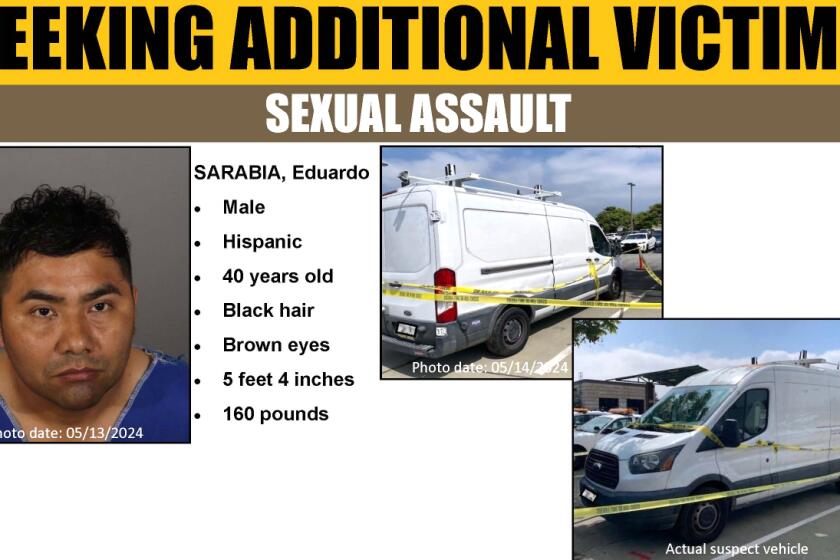Sheriff’s Department Taking a Look at Itself
To better assess job performance and service, the Ventura County Sheriff’s Department has begun reviewing criminal cases to examine how they were handled--from the initial 911 call through the investigative process.
The purpose of the new auditing program is to uncover and fix any systemic problems, provide more public accountability and better shield the department from potential lawsuits, officials said.
“It’s an internal quality control measure,” Sheriff Bob Brooks said. “The public wants assurances that their police departments are run by certain standards and meet certain expectations.”
In addition to reviewing cases, officials plan to mail questionnaires each month to residents who either were victims of crimes or dealt with deputies during a routine call. The surveys will be used to gauge consumer satisfaction.
Survey results will be analyzed by a committee of volunteers, primarily professionals with backgrounds in marketing, accounting and scientific research, who will make recommendations to the sheriff.
Both programs, part of the newly created Inspections Unit, mark the first time that the department has centralized and formalized its auditing process and given civilians a chance to weigh in on staffing and operational matters.
Reports summarizing the results of the audits and the surveys will be made available to the public on the department’s Web site, https://www.vcsd.org, within a month or so after being conducted, officials said.
The first official inquiry of criminal cases was conducted during a three-week period last month. The survey uncovered mostly minor problems that are troublesome but correctable, said Capt. Steve DeCesari, head of the Inspections Unit.
“The biggest surprise I think was that supervisors need to scrutinize reports more carefully to make sure that the errors that were seen don’t get through,” DeCesari said. “It’s not monumental, but there were some grammar problems and instances where there was no additional follow-up.”
Nothing found during the audit would have prevented a crime from being solved or a case from being prosecuted, DeCesari said, but in several instances police forms were not filled out properly and reports were not as thorough or clearly written as they could have been. These mistakes should have been spotted by supervisors, officials said.
“We didn’t find deficiencies in the work product or their performances at the scene,” said Cmdr. Mike Lewis, “but the report writing could have been better.”
Although DeCesari is technically the unit’s only officer, a sergeant was brought in from another division to conduct the first audit. He examined a dozen randomly selected felony cases and analyzed how each case was handled, from the dispatcher’s response to the filing of the case by prosecutors.
*
Sheriff’s statisticians created a program to select cases based on several criteria, including location and types of crimes, which resulted in case audits in Camarillo, Fillmore, headquarters in Ventura, Moorpark, Thousand Oaks and Ojai patrol areas.
The department plans to audit cases from every station and in every division during the next year.
The cases in the most recent audit, and those to follow, included only Part 1 crimes, involving the most serious of felonies, including burglary and assault with a deadly weapon.
For the first audit, cases involving rape and murder were excluded, because officials did not want victims of certain crimes to be re-interviewed if a case had been completed. This was done to prevent victims from having to relive their ordeals, DeCesari said.
In each case, the sergeant who performed the audits listened to the 911 tape and made notes about what the reporting party said, what was typed into the computer and how the call was dispatched.
In 11 of the 12 cases reviewed, all of the information was accurately passed on.
But in one instance, a caller described a person attacking another person with a can of soda. The dispatcher labeled the case a battery when it probably should have been classified as an assault with a deadly weapon. The error, by a veteran dispatcher, was deemed minor in the sergeant’s report, DeCesari said.
The auditor also reviewed case files, deputies’ notes and reports and interviewed detectives.
In some cases, crime-scene evidence also was pulled out of storage lockers and checked to see if it had been properly bagged and labeled.
“Certainly if we develop information that we’ve got a problem, we will do whatever necessary,” Lewis said. “If that means setting up bait to see if crooked cops take it, certainly we will do that.”
With more than 1,300 sworn and civilian personnel, officials said it was time to follow a trend being set at large departments across the country and establish a program to investigate cases internally to head off potential problems.
The idea for the unit and public surveys was raised by Brooks after he took office in 1998 and is included in the department’s five-year strategic plan.
“I learned from my friends in the military that you can only expect what you inspect,” Brooks said.
Prior to the start of the inspection program, officials said, division supervisors conducted periodic audits in their own offices, often in response to a individual’s complaint.
“What’s been done in the past has sort of been piecemeal,” Lewis said.
Cmdr. Keith Parks, head of the Thousand Oaks station, said the previous system was too casual and allowed inconsistencies among the stations to go unchecked--in areas such as filing reports and handling evidence.
Parks described the audit process as “very revealing” but said it was good training to teach “supervisors to look for these things” and make improvements.
*
Officials said a formal, centralized audit process was necessary to streamline department procedures, so that one unit is monitoring work quality and job performance, as opposed to several division managers in different locations.
The plan is to conduct one survey and one audit of a dozen cases every other month for at least a year.
The surveys were expected to go out later this month to about 500 residents.
Questions on the residents’ form include: How soon after your call did deputies arrive? Did the deputy leave you with the feeling that something would be done about what you reported?
So far, officials have selected three members of the survey review committee but expect to recruit more.
More to Read
Start your day right
Sign up for Essential California for news, features and recommendations from the L.A. Times and beyond in your inbox six days a week.
You may occasionally receive promotional content from the Los Angeles Times.






